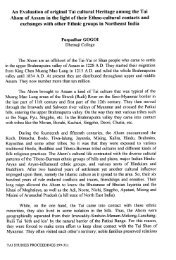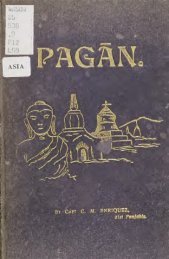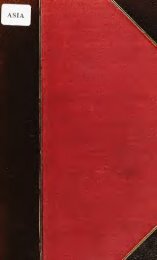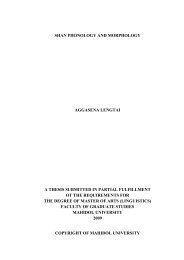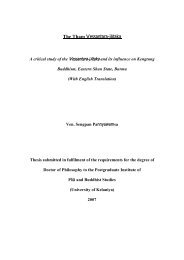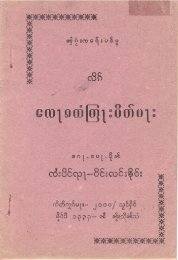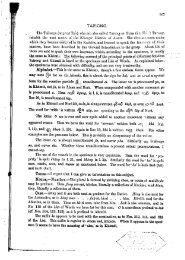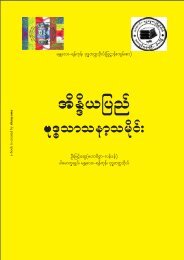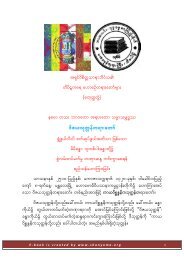The Tai Ahom National Council Memo Scheduling
The Tai Ahom National Council Memo Scheduling
The Tai Ahom National Council Memo Scheduling
Create successful ePaper yourself
Turn your PDF publications into a flip-book with our unique Google optimized e-Paper software.
Professor Amalendu Guha thinks the religion of the <strong>Ahom</strong> a “form of animism tinged<br />
with elements of ancestor worship with that of degenerated Tantric Burddhism and tribal<br />
fertility cults “ (Neo-Vaishvavism to Insurgency, Occasional paper by Centre for Social Sciences<br />
Studies, Calcutta, 1984, p. 7).<br />
David K. Wyatt, the reputed Yale University Professor of Thai History writes, “As the<br />
<strong>Ahom</strong> were not Buddhists, but practiced an animistic religion”. (Thailand ,1984, p. 41).<br />
Dr. Lipi Ghosh of South-East Asian History in Calcutta University observes “the <strong>Ahom</strong><br />
maintained their ancestral religion even after the acceptance of Hinduism”. (“<strong>Tai</strong> <strong>Ahom</strong> and<br />
Historical Jurisprudence of Assam in <strong>Tai</strong> Culture, Berlin, Vol. VI, Nos. 1&2, p. 143).<br />
Earlier about the religion of the <strong>Tai</strong>, W.A.R. Wood observes, “as a nation they (<strong>Tai</strong>)<br />
were almost certainly animists, worshipping the beneficent spirits of the hills, forests, and<br />
waters, and propitiating numerous demons with sacrifices and offerings.” (History of Siam,<br />
1924, pp. 38-39).<br />
In the same vein, Erik Seidenfaden in his book <strong>The</strong> Thai Peoples (1967, p.40) writes,<br />
“<strong>The</strong> original religion of all <strong>Tai</strong> was probably animism perhaps coupled with ancestor<br />
worship”.<br />
A large number of earthly supernatural are believed to exist who are known as phi, a term<br />
usually translated as ‘spirit’. Some of these are guardian gods of the earthly objects like Phi Nam<br />
(guardian spirit of water/river), Phi-Tun (guardian spirit of tree), Phi Phai (guardian spirit of<br />
fire), Phi Ruen (guardian spirit of the house), Phi Doi (guardian spirit of hill), and others. Hence<br />
for the protection of paddy, fruits, plants, water, fields, their guardian spirits must be propitiated<br />
with prayer and by offerings such articles as they like to have. Otherwise the belief is that they<br />
will cause trouble. In addition to these spirits, the <strong>Ahom</strong>s believed and still believe that there are<br />
malignant spirits also called phi who cause trouble and disturb peace. Hence they are also<br />
regularly offered articles like chicken, fish, rice, and other things to keep them happy. Thus the<br />
<strong>Ahom</strong> priests regularly worshiped all the gods and spirits.<br />
© <strong>Ahom</strong> System of Divination:<br />
<strong>The</strong> <strong>Ahom</strong>s throughout their history believed in divination.<br />
Mirza Nathan, whose real name was ‘Alau’d-Din Isfahani, the commander of the<br />
Mughal army that fought wars against the <strong>Ahom</strong> from 1608-24 A.D. records,



